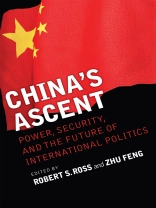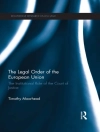Assessments of China’s importance on the world stage usually focus on a single dimension of China’s increasing power, rather than on the multiple sources of China’s rise, including its economic might and the continuing modernization of its military. This book offers multiple analytical perspectives—constructivist, liberal, neorealist—on the significance of the many dimensions of China’s regional and global influence.Distinguished authors consider the likelihood of conflict and peaceful accommodation as China grows ever stronger. They look at the changing position of China ‘from the inside’: How do Chinese policymakers evaluate the contemporary international order and what are the regional and global implications of that worldview? The authors also address the implications of China’s increasing power for Chinese policymaking and for the foreign policies of Korea, Japan, and the United States.
Contributors: Robert Art, Brandeis University; Avery Goldstein, University of Pennsylvania; G. John Ikenberry, Princeton University; Byung-Kook Kim, Korea University; Jonathan Kirshner, Cornell University; Jeffrey W. Legro, University of Virginia; Jack S. Levy, Rutgers University; Qin Yaqing, China Foreign Affairs University; Robert S. Ross, Boston College; Akio Takahara, University of Tokyo; Tang Shiping, Nanyang Technological University, Singapore; Wei Ling, China Foreign Affairs University; Zhu Feng, Peking University
Daftar Isi
Introduction
by Robert S. Ross and Zhu Feng Part I: Structure, Power Transitions, and the Rise of China Chapter1: Power Transition Theory and the Rise of China
by Jack S. LevyChapter 2: China’s Rise Will Be Peaceful: How Unipolarity Matters
by Zhu FengChapter 3: Parsing China’s Rise: International Circumstances and National Attributes
by Avery Goldstein Part II: International Institutions and the Rise of China Chapter 4: The Rise of China: Power, Institutions, and the Western Order
by G. John IkenberryChapter 5: Structures, Processes, and the Socialization of Power: East Asian Community- building and the Rise of China
by Qin Yaqing and Wei Ling Part III: Chinese Policymaking and the Rise of China Chapter 6: From Offensive to Defensive Realism: A Social Evolutionary Interpretation of China’s Security Strategy
by Tang ShipingChapter 7: Purpose Transitions: China’s Rise and the American Response
by Jeffrey W. Legro Part IV: Responding to the Rise of China Chapter 8: Between China, America, and North Korea: South Korea’s Hedging
by Byung- Kook KimChapter 9: A Japanese Perspective on China’s Rise and the East Asian Order
by Akio TakaharaChapter 10: The Consequences of China’s Economic Rise for Sino-U.S. Relations: Rivalry, Political Conflict, and (Not) War
by Jonathan KirshnerChapter 11: The United States and the Rise of China: Implications for the Long Haul
by Robert J. Art Part V: Conclusion Chapter 12: The Rise of China: Theoretical and Policy Perspectives
by Robert S. Ross and Zhu FengIndex
Tentang Penulis
Robert S. Ross is Professor of Political Science at Boston College. He is the author of Negotiating Cooperation: The United States and China, 1969-1989, coauthor of Great Wall and Empty Fortress: China’s Search for Security, and editor or coeditor of several other books. Zhu Feng is Professor in the School of International Studies at Peking University.












